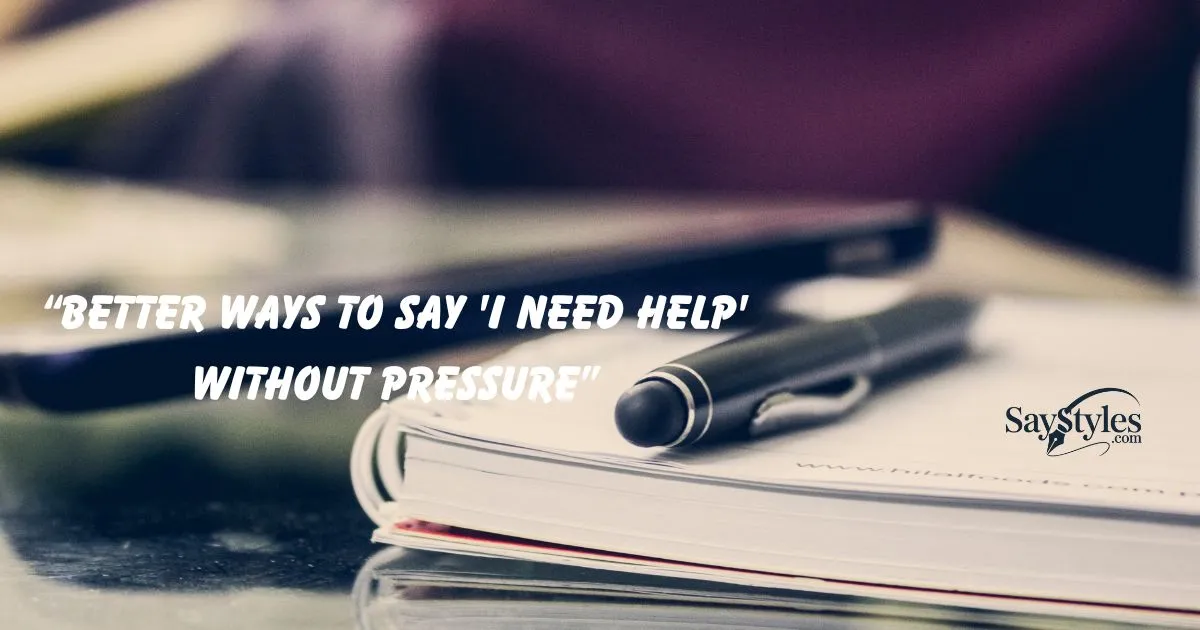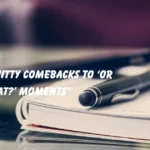“Saying ‘I need help’ doesn’t make you weak it makes you wise.”
Hi, I’m glad you’re here because asking for help isn’t always easy, right? I’ve been there too, stuck in a moment where I didn’t know how to say, “I need help,” without sounding too desperate or scared. It can feel heavy, awkward, or even embarrassing. But here’s the truth we all need a little support sometimes.
The problem isn’t needing help, it’s how we say it. And that’s where better ways to say ‘I need help’ come in. Sometimes, a softer or clearer phrase can open the door to support without pressure, guilt, or fear. Trust me, the right words can truly change how people respond.
In this article, I’ll walk you through simple, pressure-free ways to ask for help using kind, honest language anyone can understand. Whether you’re texting a friend or talking to your boss, these phrases will help you speak up with confidence and calm.
What ‘I Need Help’ Really Means
When someone says “I need help”, it usually expresses difficulty, stress, or a request for support. In casual or playful conversations, it can also be a setup for funny or witty responses, turning a serious plea into a lighthearted and engaging moment.
List of Ways to Say ‘I Need Help’ Without Pressure
- “Could you assist me with this?”
- “Can you lend me a hand?”
- “I could use some support with this.”
- “Could you provide some guidance?”
- “I need your expertise on this matter.”
- “Would you be able to help me out?”
- “I’m seeking your assistance with something.”
- “Can you help me figure this out?”
- “I could use some help with this task.”
- “Could you assist me in completing this?”
- “I need some help with this project.”
- “Would you mind helping me?”
- “I’m in need of your help with something.”
- “Can you provide some assistance here?”
- “I’d appreciate your help with this.”
- “Would you be willing to help me with this?”
- “I’m struggling with this, can you help?”
- “I could use some help with this problem.”
- “Could you help me resolve this?”
- “I’m looking for some help with this task.”
- “I need your input on this.”
- “Can you help me tackle this?”
- “I’m in need of your support for this.”
- “Could you give me a hand with this?”
- “I’m hoping you can help me out.”
- “Can you assist me with this matter?”
- “I’m reaching out for your help with this.”
- “I need some assistance with this issue.”
- “Could you help me make sense of this?”
- “I need your help to sort this out.”
- “Could you spare some time to help me?”
- “I’d appreciate your help with this situation.”
- “Can you support me with this task?”
- “Would you mind helping me out here?”
- “I’m counting on your help with this.”
1. “Could you assist me with this?”
Story: You’re politely asking for someone’s support.
When to Use: In formal or professional situations.
When Not to Use: When a casual tone is preferred.
Example:
Them: “Do you need anything?”
You: “Could you assist me with this?”
How to Respond: Use a polite and respectful tone.
2. “Can you lend me a hand?”
Story: You’re asking for practical help in a friendly way.
When to Use: When talking with friends or coworkers.
When Not to Use: In highly formal or serious contexts.
Example:
Them: “Need some help?”
You: “Can you lend me a hand?”
How to Respond: Say it with a warm, approachable voice.
3. “I could use some support with this.”
Story: You’re expressing that you need some backing or assistance.
When to Use: When feeling a bit overwhelmed or unsure.
When Not to Use: If you want to appear completely confident.
Example:
Them: “Everything okay?”
You: “I could use some support with this.”
How to Respond: Be open and sincere.
4. “Could you provide some guidance?”
Story: You’re seeking advice or direction.
When to Use: When you want expert input or direction.
When Not to Use: When you need immediate hands-on help.
Example:
Them: “Need any advice?”
You: “Could you provide some guidance?”
How to Respond: Ask clearly and respectfully.
5. “I need your expertise on this matter.”
Story: You’re acknowledging someone’s skills or knowledge.
When to Use: When you want to show respect for their expertise.
When Not to Use: In informal or casual chats.
Example:
Them: “What’s going on?”
You: “I need your expertise on this matter.”
How to Respond: Express gratitude and seriousness.
See also: “Best Ways to Reply When Someone Says They’re Happy”
6. “Would you be able to help me out?”
Story: You’re politely checking if the person can assist.
When to Use: When you’re unsure if they are available.
When Not to Use: When you need urgent help.
Example:
Them: “What do you need?”
You: “Would you be able to help me out?”
How to Respond: Use a considerate and gentle tone.
7. “I’m seeking your assistance with something.”
Story: You’re formally expressing your need for help.
When to Use: In professional or serious situations.
When Not to Use: In casual chats with close friends.
Example:
Them: “Can I help?”
You: “I’m seeking your assistance with something.”
How to Respond: Be clear and direct.
8. “Can you help me figure this out?”
Story: You’re asking for help with problem-solving.
When to Use: When you’re stuck and want collaborative help.
When Not to Use: If you want someone to just do it for you.
Example:
Them: “What’s the issue?”
You: “Can you help me figure this out?”
How to Respond: Sound open and inviting.
9. “I could use some help with this task.”
Story: You’re straightforwardly asking for practical help.
When to Use: When workload is heavy or you’re overwhelmed.
When Not to Use: When you want to do it alone.
Example:
Them: “Need assistance?”
You: “I could use some help with this task.”
How to Respond: Be honest and appreciative.
10. “Could you assist me in completing this?”
Story: You’re politely requesting help to finish something.
When to Use: When you want to emphasize finishing a project.
When Not to Use: If you just want general help or advice.
Example:
Them: “What’s next?”
You: “Could you assist me in completing this?”
How to Respond: Use a formal and respectful tone.
11. “I need some help with this project.”
Story: You’re directly stating your need.
When to Use: In both professional and casual settings.
When Not to Use: If you want to be more subtle.
Example:
Them: “How’s the project going?”
You: “I need some help with this project.”
How to Respond: Be clear and straightforward.
12. “Would you mind helping me?”
Story: You’re politely requesting help.
When to Use: When you want to be courteous.
When Not to Use: If you need urgent or immediate help.
Example:
Them: “What do you need?”
You: “Would you mind helping me?”
How to Respond: Speak gently and respectfully.
13. “I’m in need of your help with something.”
Story: You’re emphasizing your need for assistance.
When to Use: When it’s important and specific.
When Not to Use: In casual or light-hearted conversations.
Example:
Them: “How can I assist?”
You: “I’m in need of your help with something.”
How to Respond: Be serious and appreciative.
14. “Can you provide some assistance here?”
Story: You’re politely asking for help.
When to Use: When you want a straightforward but polite request.
When Not to Use: When you want to sound informal.
Example:
Them: “What do you need?”
You: “Can you provide some assistance here?”
How to Respond: Use a calm and respectful tone.
15. “I’d appreciate your help with this.”
Story: You’re expressing gratitude in advance.
When to Use: When you want to encourage a positive response.
When Not to Use: When you’re not sure if they can help.
Example:
Them: “Need anything?”
You: “I’d appreciate your help with this.”
How to Respond: Be warm and thankful.
16. “Would you be willing to help me with this?”
Story: You’re gently asking for their willingness to assist.
When to Use: When you want to respect their choice.
When Not to Use: If you need immediate help.
Example:
Them: “What’s up?”
You: “Would you be willing to help me with this?”
How to Respond: Speak with polite sincerity.
17. “I’m struggling with this, can you help?”
Story: You’re honestly sharing your difficulty.
When to Use: When you want empathy and support.
When Not to Use: If you want to sound confident.
Example:
Them: “Everything okay?”
You: “I’m struggling with this, can you help?”
How to Respond: Use a humble and open tone.
18. “I could use some help with this problem.”
Story: You’re straightforward about needing help.
When to Use: When you want to solve a specific issue.
When Not to Use: If you just want general support.
Example:
Them: “Need a hand?”
You: “I could use some help with this problem.”
How to Respond: Be clear and focused.
19. “Could you help me resolve this?”
Story: You’re asking for assistance in finding a solution.
When to Use: When there’s a conflict or challenge.
When Not to Use: In casual conversations.
Example:
Them: “What’s wrong?”
You: “Could you help me resolve this?”
How to Respond: Be calm and respectful.
20. “I’m looking for some help with this task.”
Story: You’re expressing a need for assistance.
When to Use: When delegating or requesting help.
When Not to Use: If you prefer to do it alone.
Example:
Them: “Can I help?”
You: “I’m looking for some help with this task.”
How to Respond: Be polite and appreciative.
21. “I need your input on this.”
Story: You’re requesting their opinion or advice.
When to Use: When collaboration is needed.
When Not to Use: If you want to decide alone.
Example:
Them: “What do you think?”
You: “I need your input on this.”
How to Respond: Use a collaborative tone.
22. “Can you help me tackle this?”
Story: You’re inviting teamwork.
When to Use: When a joint effort is required.
When Not to Use: If you want to keep it solo.
Example:
Them: “What’s the plan?”
You: “Can you help me tackle this?”
How to Respond: Be energetic and encouraging.
See also: Sweet Replies That’ll Melt Hearts and Raise Smiles
23. “I’m in need of your support for this.”
Story: You’re emphasizing emotional or practical support.
When to Use: When the situation is challenging.
When Not to Use: If it’s a minor issue.
Example:
Them: “How can I assist?”
You: “I’m in need of your support for this.”
How to Respond: Be sincere and appreciative.
24. “Could you give me a hand with this?”
Story: You’re casually asking for help.
When to Use: In informal settings.
When Not to Use: If the request is formal.
Example:
Them: “Need help?”
You: “Could you give me a hand with this?”
How to Respond: Keep it friendly and light.
25. “I’m hoping you can help me out.”
Story: You’re expressing hopeful reliance.
When to Use: When you trust the person.
When Not to Use: If you’re unsure about their willingness.
Example:
Them: “What do you need?”
You: “I’m hoping you can help me out.”
How to Respond: Use a hopeful and warm tone.
26. “Can you assist me with this matter?”
Story: You’re formally requesting help.
When to Use: In professional or official contexts.
When Not to Use: In casual talks.
Example:
Them: “How can I help?”
You: “Can you assist me with this matter?”
How to Respond: Be polite and professional.
27. “I’m reaching out for your help with this.”
Story: You’re actively seeking support.
When to Use: When you want to highlight the importance.
When Not to Use: In minor issues.
Example:
Them: “Need anything?”
You: “I’m reaching out for your help with this.”
How to Respond: Be earnest and respectful.
28. “I need some assistance with this issue.”
Story: You’re clearly stating your need.
When to Use: When the problem is specific.
When Not to Use: If you want a casual tone.
Example:
Them: “What’s the problem?”
You: “I need some assistance with this issue.”
How to Respond: Stay clear and polite.
29. “Could you help me make sense of this?”
Story: You’re asking for help to understand something.
When to Use: When confused or uncertain.
When Not to Use: If you want direct action.
Example:
Them: “What’s confusing?”
You: “Could you help me make sense of this?”
How to Respond: Use a curious and open tone.
30. “I need your help to sort this out.”
Story: You’re asking for assistance to fix or organize.
When to Use: When something needs resolution.
When Not to Use: If it’s a trivial matter.
Example:
Them: “What’s the issue?”
You: “I need your help to sort this out.”
How to Respond: Be clear and appreciative.
31. “Could you spare some time to help me?”
Story: You’re politely requesting their time and assistance.
When to Use: When you want to show respect for their schedule.
When Not to Use: If it’s urgent and needs immediate attention.
Example:
Them: “What’s up?”
You: “Could you spare some time to help me?”
How to Respond: Use a considerate and gentle tone.
32. “I’d appreciate your help with this situation.”
Story: You’re expressing gratitude in advance.
When to Use: When you want to show respect and thanks.
When Not to Use: If it’s a casual favor.
Example:
Them: “How can I help?”
You: “I’d appreciate your help with this situation.”
How to Respond: Be warm and thankful.
33. “Can you support me with this task?”
Story: You’re asking for both practical and moral support.
When to Use: When teamwork is important.
When Not to Use: If you prefer to work alone.
Example:
Them: “Need a hand?”
You: “Can you support me with this task?”
How to Respond: Be encouraging and friendly.
34. “Would you mind helping me out here?”
Story: You’re politely asking for a favor.
When to Use: In respectful or formal settings.
When Not to Use: If it’s an urgent demand.
Example:
Them: “What’s going on?”
You: “Would you mind helping me out here?”
How to Respond: Use a soft and respectful tone.
35. “I’m counting on your help with this.”
Story: You’re expressing trust and reliance.
When to Use: When you want to show confidence in someone.
When Not to Use: If you’re unsure about their willingness.
Example:
Them: “How can I assist?”
You: “I’m counting on your help with this.”
How to Respond: Speak with sincere trust and warmth.
How These Clever Responses Actually Work
Funny replies to “I need help” work by adding humor, exaggeration, or playful twists. Instead of simply offering assistance, a clever comeback like, “Help? Sure, but I only accept snacks as payment!” surprises and engages the listener. These responses show wit, personality, and charm, making even urgent phrases fun and memorable.
Top Editor Choice Responses
- “Could you walk me through this with me real quick?”
- “Mind giving me a hand when you’re free?”
- “Can I run something by you for a sec?”
- “I’d love your input on this if you’re up for it.”
- “I’m a little stuck—any chance you can help me think this through?”
- “Do you have a moment to help me figure something out?”
- “I’d really value your perspective on this.”
- “Can we put our heads together for a minute?”
- “I could use some backup here—do you mind?”
- “Would you be open to helping me with this?”
- “This has me puzzled. Could you help me unravel it?”
- “Could I borrow your brain for this?”
- “I could use a second opinion.”
- “Want to team up on this real quick?”
- “Can you guide me through this part?
Conclusion
Asking for help doesn’t have to feel like a burden or weakness it’s actually a sign of self-awareness and strength. The way we phrase our request can make all the difference in how it’s received.
Using more thoughtful, pressure-free language allows others to offer support without feeling obligated or overwhelmed. When you’re navigating work, school, or personal life, these casual yet respectful phrases make it easier to connect with others and get the assistance you need. Remember, communication isn’t just about asking, it’s about how you ask.
Try these approaches in your everyday conversations and you’ll notice better responses, stronger collaboration, and even improved relationships. Be kind, be clear, and most importantly, be human. The right words can open the right doors—no pressure required.

I’m Lily Hart, the Admin behind the engaging responses at SayStyles.com! With a knack for blending wit and warmth, I turn every piece of writing into something memorable. From clever advice to fun comebacks, I’m here to make sure every response leaves you smiling and thinking.






